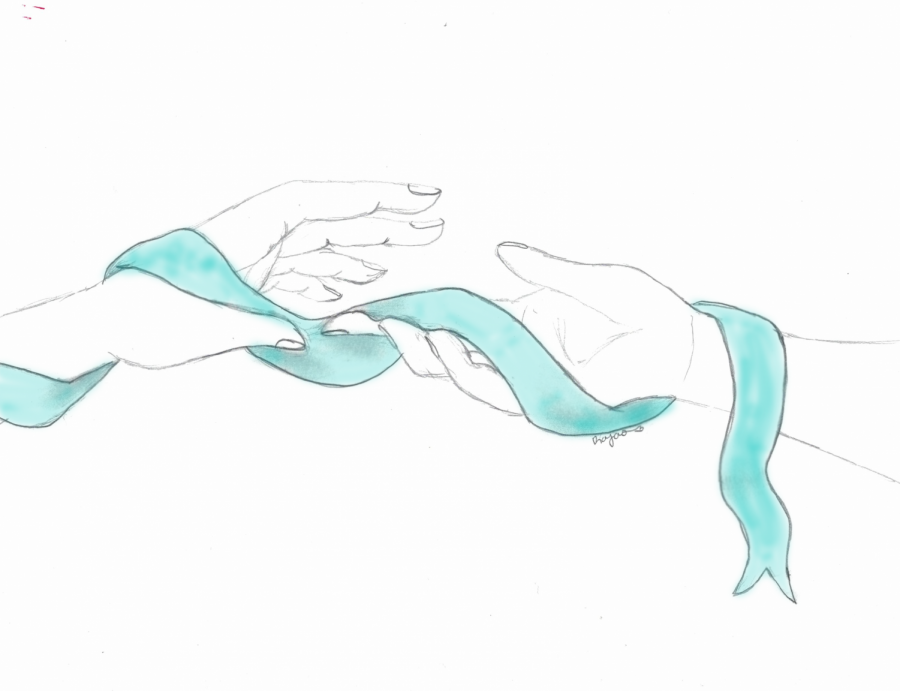It’s not their fault
Survivors of assault should never be at blame of what happened to them.
Hands wrapped together by the Sexual Assault Awareness ribbon.
May 3, 2019
A few months ago, I was sitting on the bleachers as I watched a highly anticipated football game between Oakmont and Roseville. It was warm, smelled like nacho cheese, and we lost–but that did not shock me. What did shock me was the conversation I overheard from the girls seated behind me.
Their chatter was lost among the screams and cheers of the team’s fans, but a few comments caught my attention. They were discussing a girl who had accused a boy of raping her, and how even if she was telling the truth, they can’t blame him for wanting to have sex with her because of the way she dresses, “She was asking for it.”
I felt shocked that these girls who I considered my peers thought in such a narrow and ignorant matter. I felt disgusted and angry, and I regret not saying anything.
However, here is my chance to share my thoughts.
While these girls behind me may just be ignorant, they definitely cannot be the only ones who think this way. To me, I find it sad that we still struggle with these topics all the way into 2019. Those perceptions of what is and what is not sexual assault are fogged by unnecessary questions regarding the victim’s contributions to the incident.
It is never the victim’s fault. No matter their clothing, actions, gestures, or words, sexual assault is at the blame of the perpetrator who engages in it. Never is it the victim’s fault, and it never will be.
Neither a person assaulted in a short skirt, or a person assaulted in baggy jeans, asked for their assault. As well as someone being flirty or someone “playing hard to get” did not invite their assault. People are assaulted because of people’s misconceptions of kindness and boundaries.
Much of the time, I hear stories of my friend’s kindness being mistaken as sexual advances by their peers. I find it sad that girls and women, as well as men and boys, have to consciously limit how kind they are in order to avoid undesirable sexual attempts by those around them.
Let me be clear, the only way to know if advances will be accepted are if they are explicitly asked for. I feel like that should be common sense, but unfortunately, it has been proven that it is not. This is shown by the devastating numbers of reported sexual assaults.
However, these misconceptions must stem from somewhere. They lie in a term known today as ‘rape culture’. It is used heavily in the media, and I believe that has diminished the true meaning of the term. As defined by Oxford Dictionary, rape culture is: “A society or environment whose prevailing social attitudes have the effect of normalizing or trivializing sexual assault and abuse.”
According to the definition, the girls at the football game contributed to rape culture by saying she, the victim, deserved it. However, rape culture is not limited to comments–it goes as far as: Sexual assault prevention education programs that focus on potential-victims being told to take measures to prevent rape instead of people being told not to rape, victims not being taken seriously when they report assault, the ubiquity of street harassment (cat calling)–and how victims are told that they are “overreacting” when they call it out. Sadly, the list goes on and on.
It is also important that people are aware of the magnitude of effects that come with sexual assault–it carries on far past the event itself. There is the potential shame, PTSD, anger, depression, destroyed relationships, and so much more that survivors may face. With all they suffer with, comments made like the ones from the girls at the football game make these circumstances worse for these people. The assaulters are who deserve the entirety of the blame.
But, there are cases where assault is falsely accused to gain revenge or whatever is being seeked. False accusations are just as terrible as true ones, because they both cause the same effect upon the abuser, even if the case is true or not.
In reality, it is just easier on everyone to just ask for consent, and respect whichever answer is given. And to survivors, someone will believe you and you are heard, so continue to share your story.



